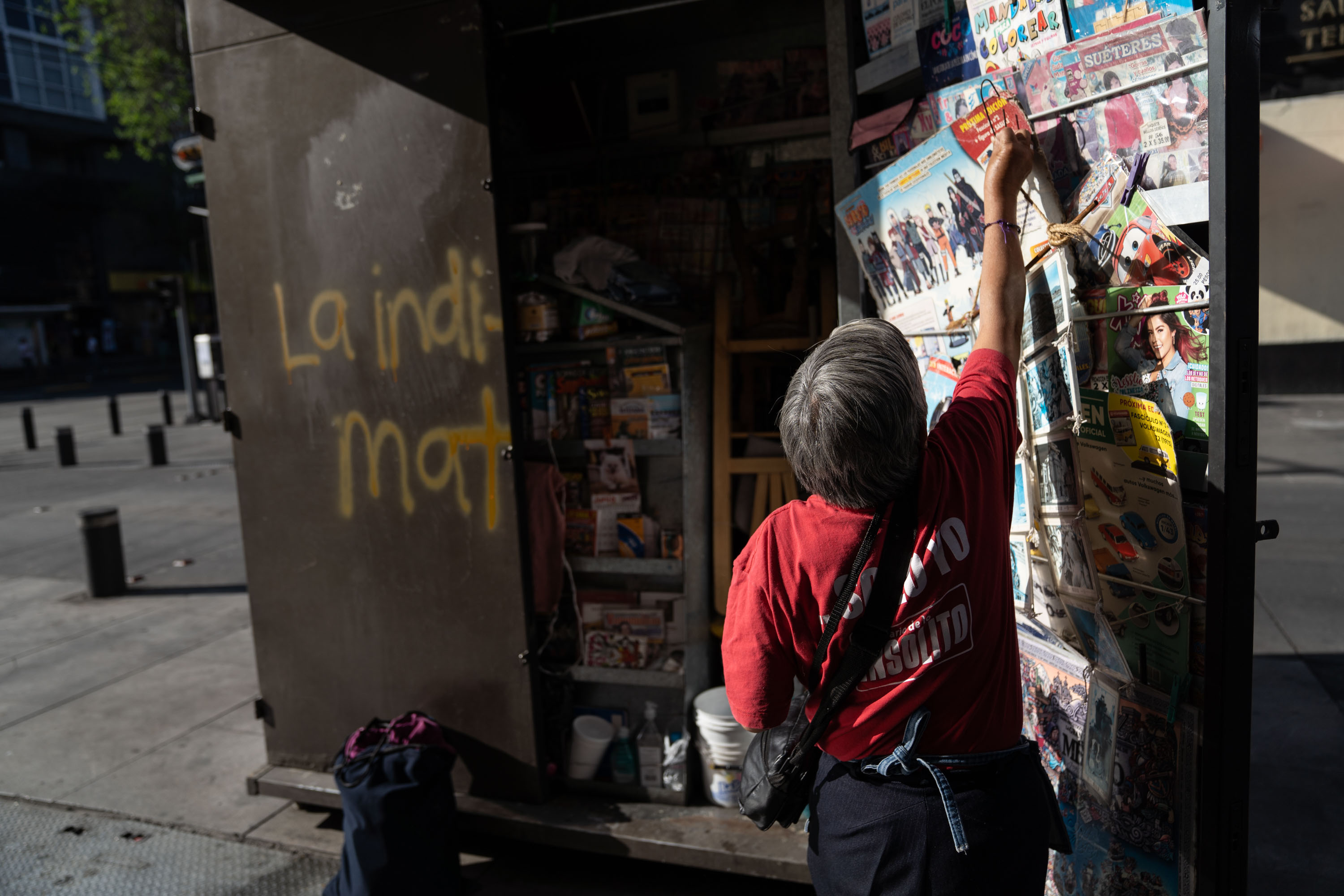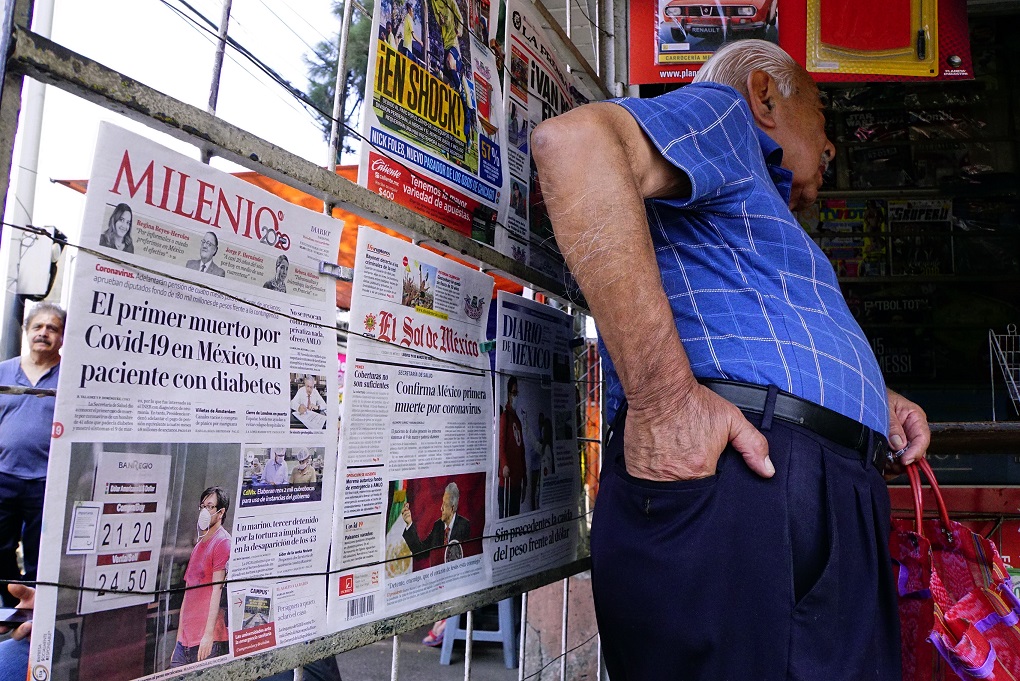"كلماتنا في وجه رصاصكم"، هي العبارة الأكثر انتشارا في احتجاجات الصحفيين، كلما اغتيل لهم زميل في المكسيك. تحولت الجملة/اللازمة إلى صرخة استنفار، على اليافطات واللوحات الكرتونية والمنشورات، حتى على صفحات الإنترنت. هي صرخة تنشد العدالة، العدالة التي لا تتحقق أبدا، ليس في هذا المكان فحسب.
وفقا لمنظمة "المادة 19"، اغتيل 135 مراسلا صحفيا خلال العقدين الماضيين، بينما لا يزال أكثر من 24 صحفيا في عداد المفقودين. لقد كانت الفترة الأشد دموية تجاه الصحفيين هي السنوات الست الماضية.

جريمة بلا عقاب
اعتاد مكتب المدعي العام للجمهورية توجيه أصابع الاتهام إلى مهربي المخدرات في معظم جرائم القتل المرتكبة بحق الصحفيين، قليلا جدا ما كانت الحكومة المكسيكية تذكر في مَحاضِرها أن خيوط الجريمة في العديد من تلك الجرائم المنظمة تتشابك مع مسؤولين حكوميين أو رجال أمن أو أعضاء في البرلمان أو رؤساء بلديات.
في الثاني من كانون الثاني/يناير الماضي، أقدم خورخي سانشيز على كتابة كلمة "الإفلات من العقاب" بطباشير بيضاء وبخط كبير الحجم في ساحة "ليردو" مقابل مبنى رئاسة الحكومة. كانوا قد قتلوا والده مويسس سانشيز سيريزو، الذي عمل محررا في صحيفة "لا أونيون" قبل ست سنوات، وهي إحدى الصحف المحدودة الانتشار في منطقة حمراء على خليج المكسيك. حينها أشارت لائحة الاتهام إلى ستة من متقاعدي الأمن الذين تركوا وظيفتهم ليلتحقوا بعصابة "خاليسكو/الجيل الجديد" كقتلة مأجورين، حيث أقدموا على "رفع" مويسس سانشيز وتعذيبه بعنف مفرط داخل منزله. عُثر على جثته بعد 19 يوما، مُقطَّعة إلى أجزاء صغيرة في أكياس سوداء، داخل إحدى الملكيات العقارية في بلدة مجاورة.
توصلت تحقيقات النيابة العامة، وقتئذ، إلى أن العقل المدبر للجريمة هو عمدة "ميديجين"، أومار كروز. لقد مرت ست سنوات وما زال فارّا من وجه العدالة. واحد فقط من بين الستة المشتركين في الجريمة أُودع السجن، فيما تأتي حكومات وتذهب وأخرى تمضي، ويبدو أنه لن يأتي من "يقتصُّ لقتل أبي ويحقق العدالة التي أنشدها" يقول خورخي.
"قَتْلُ الصحفيين لن يقتل الحقيقة"، برنامج وثائقي أعده الصحفي والكاتب تيموريس غريكو، الذي عاد إلى المكسيك بعد عمله في تغطية النزاعات المسلحة في بلدان مثل سوريا وليبيا والصومال، ليجد بلاده تعيش حربا خفية، صامتة، تستهدف تدمير الصحافة بشكل كامل. تواصلتُ معه، فشهادته تبدو لي مهمةً لهذا المقال: "نعيش ظروفا محفوفة بالمخاطر، النشاط الصحفي يجري دون أدنى ضمانات أمنية، إن لم تسحقك الحكومة، تجار المخدرات سيفعلون، إنهم يقومون بذلك في أنحاء واسعة من البلاد بحس من المسؤولية والمقاومة".
يقول غريكو إن نبأ مقتل صحفيٍّ في المكسيك، وعلى يد مهرِّبي المخدرات، يجعلك تحس لدى سماعه كأن "دلوا من الماء المثلج انسكب على رأسك"، يجعلك تدرك الفوضى التي تنجرّ إليها البلاد، "يجعلك تفتح عينيك على اتساعهما، وتقول لنفسك: هذا أسوأ بكثير مما كنا نتوقع".

مرحبا سيدي مهرّب المخدرات، هل يمكنني مقابلتك؟
مراسلان من أحد التلفزيونات السويدية سافَرا أكثر من عشرة آلاف كيلومتر عبر رحلتين جويتين، وبعدها قطَعَا مسافة أربعمئة كيلومتر عبر البر، كان هدفهما أن يعرفا كيف تُمارَس الصحافة في المكسيك تحت ضغط مهربي المخدرات. بإنجليزية/إسبانية ركيكة، كانت المراسِلة تصر على مقابلة أحد قادة عصابة "لوس زيتاس"، أجبتُها أنا بصفتي مرشدا لها هناك: "ليس الأمر بتلك البساطة، لا يمكنك الذهاب هكذا ثم.. مرحبا سيدي مهرب المخدرات، هل لي بمقابلتك؟". ظلت تُلِحّ عليَّ في البحث عن مهربي المخدرات في مرفأ "فيراكروز"، ومن ثَمّ حاولَت مع القائد الميداني لإحدى العصابات في "خالابا".
كانت تسأل في وسط العاصمة عما إذا كانت هنالك شروط معينة ينبغي القيام بها لإقناع مهرب المخدرات بالجلوس أمام الكاميرا. شيئا فشيئا بدأ الإحباط يتسلل إلى نفسها، وفي اليوم الثالث من المهمة وبينما كنا على وشك دخول أحد الأحياء المهمَّشة، بدأت مجموعة من "الرّماة" -تسمية لبائعي المخدرات بالتقسيط- بملاحقتنا. كانوا يلتقطون لنا صورا بهواتفهم، ربما بَدَونا لهم زبائنَ محتمَلين للماريوانا أو الكوكايين. لم ينتبهوا أننا كنا عبارة عن صحفيَّين أوروبيَّين وسائق أجنبي وصحفي مكسيكي يقوم بدور الدليل. بدأت المراسلة السويدية تصيح بالسائق وعيناها ممتلئتان بالدمع: "لا أريد أن أموت"، حتى استطعنا الهرب من هناك. في الأيام التالية، لم تعد تطلب مقابلة مهربي مخدرات، اكتفَت بسؤال دليلها وتكرار السؤال: "ألم تكن خائفا أن تموت هناك؟".
في المكسيك، شعرةٌ رفيعة جدا تفصل بين الجريمة المنظَّمة والصحافة. إن مصطلحات مثل التعاون المشترك، وتهديدات كـ "المال أو الرصاص؟"، والترهيب المتكرر: "أنا من يقرر هنا ما يُنشَر وما لا يُنشَر"، تنتشر في الجبال والسواحل المكسيكية، وفي البلدات القصية. زعماء التهريب وصغار التجار -عادة ما يتنكّرون بزي رعاة المواشي- هم من يفرض الأوامر.
في هذا البلد، ثلاثة من الصحفيين فقط تمكنوا من إجراء مقابلات مع مهربي مخدرات من "المستوى الرفيع": خوليو شيرر غارسيا، رئيس التحرير السابق لمجلة "بروسيسو"، الذي خاطر بزيارة إلى الجبل للقاء إسماعيل إل مايو سامبادا، واحد من كبار القادة في عصابة "سينالاو"، إحدى أكبر عصابات الجريمة في البلاد، وأنابيل إيرنانديز، مؤلفة كتاب "إل ترايدو/الخائن"، بعد أن تمكنت من الاطلاع على مذكرات بيسنته سامبادا نييبلا، الذي كان يقبع في سجن بالولايات المتحدة ضمن أقصى درجات الحراسة المشددة، وخافيير فالديز، صحفي من سينالاو ومقيم في "كولياكان"، عاصمة الجريمة المنظمة في العالم، والذي استطاع التواصل مع محامِين وقتلة مأجورين وسياسيين متورطين في التهريب، تمكن عبر تواصله معهم من جمع معلومات نشرَها في العمود الذي كان يتولى كتابته بعنوان "عشبة الشرّ"، وفي تقاريره لمجلة "ريو دوسِّه"، وفي عمله كمراسل لـ"لا خورنادا"، هذه الأخيرة تعتبر أهم صحف اليسار في البلاد.
لا تقترب من "عشبة الشر"
كانت قصة فالديز عجيبة بعض الشيء. على مدى عشرين عامًا قام بتغطية جرائم قتل منظم، وكشف شبكات القوة بين الشرطة والمهربين. بالنصوص التي كان ينشرها اعتبره صحفيو الجيل الجديد مُعلّما ومُلهِما، لكن في المقابل، فإن خلافا داخليا في عصابات سينالاو أودى بحياته. الصحاي السينالاوي قُتل في 15 أيار/مايو 2017، قاتله الفعلي إيربيرتو بيكوس بارّاسا أو كما يعرف بـ "إل كوالا"، ترصَّده خلسةً خارج مبنى صحيفة "ريو دوسِّه" إلى أن غادر مقر عمله. أجبره على الترجل من سيارته وأن يجثو على ركبتيه، أطلق النار على رأسه، ثم أتبعها بطلقات عدة في أجزاء متفرقة من جسده. العقل المدبر للجريمة لم يُكتشف حتى الآن، كانت من آخر أعمال فالديز مقابلة تمت عبر طرف ثالث مع رجل الأمن المتقاعد الذي تحول إلى مهرب مخدرات، داماسو لوبيز - إل ليسنسيادو، والذي كان على عداوة مع عصابة سينالاو. أثار نشر المقابلة غضب أبناء خواكين إل تشابو غوسمان، المعتقل في الولايات المتحدة، والذي صنّفته مجلة فوربس واحدًا من أغنى الشخصيات في العالم.
بين كلا الطرفين؛ إل تشابو غوسمان وإل ليسنسيادو، هناك العديد من الأصدقاء المتهمين كذلك بمقتل الصحفي. في السياق ذاته، صدر الحكم على الجاني الفعلي "إل كوالا" بالسجن خمسة عشر عاما.
غريسيلدا تريانا، أرملة خافيير فالديز، منذ أربعة أعوام وهي تطالب بالقِصاص العادل للجريمة الجبانة التي ارتكبت بحق زوجها، اضطرت إلى الانتقال من بلدتها الأم مع أبنائها لتجنُّب أي اعتداء محتمل. عبر الفيسبوك تُذكّر تريانا بمنشورات شهرية لها بمدى صعوبة المطالبة بالعدالة في المكسيك، لكنها في الوقت ذاته، تُذكّر بمقدار الحاجة إلى وجود صحفيين يمتلكون من الشجاعة ما كان يمتلكه خافيير فالديز وغيره من الذين سُلبوا حياتهم بغير ذنب سوى أنهم تكلموا بحقيقة ما يجري في بلادهم.
"غالبية أهالي الصحفيين الذين قتلوا، والمفقودين كذلك -دعونا لا ننسى أن هنالك صحفيين مفقودين- تُركوا في النهاية وحدهم يطالبون بالعدالة، لم يساندهم أحد، ربما كانت حالتي مختلفة، فقد تلقيت دعما من المؤسسات التي عمل فيها خافيير، خرجت من سينالاو لانعدام الأمن فيها ولجأت إلى ناحية أخرى من البلاد، واليوم ها أنا أقف على قدميّ وأكرر مطالبتي بالعدالة".
"سنواصل الكلام"
بدعم من منظمات "المجتمع المدني" غير الحكومية، أُطلقت حملة "سنواصل الكلام"، والتي تقوم على إعادة خلق فالديز افتراضيا، بهدف تجريم القضاء المكسيكي، في اغتياله، وإفلات الجناة من العقاب في حوادث متكررة: "لقد أثار جدلا كبيرا، حيث يَظهر فالديز في أحد المقاطع التي نشرتها الحملة، عائدا من البعيد، ويطالب الرئيس نفسه بالعدالة في قضيته".
إسكييل فلوريس، صحفي مكسيكي فر هاربا من مقاطعة غيرّيرو، أو الأرض الساخنة كما يسمّونها، تشتهر بزراعة بذور الخشخاش. وفي أيلول/سبتمبر 2016 كان قد اختفى فيها 43 طالبا من معهد أيوتسينابا، بالكاد استطاع فلوريس حزم حقيبتين فقط وضع فيهما ملابسَه، وبرفقة كلب الصيد الذي كان يملكه لجأ إلى العاصمة، وصار يُصدر تقاريره من هناك حول ما يدور في بلدته، عَقِبَ كمٍّ كبير من التهديدات التي وصلته - بعضُها كان من طرف الجيش - وجد فلوريس نفسه مجبرا على تغيير مكان إقامته، والتقدم بطلب لبرنامج "حماية المدافعين عن حقوق الإنسان"، وهو برنامج حكومي يتيح لجوءا مؤقتا إلى أن ينخفض - ما يسمونه - مستوى مخاطر الصحفي.
حال فلوريس هذه كانت حال عشرات من الصحفيين الذين أجبروا على ترك بلداتهم والانتقال إلى أماكن أكثر أمانا بعد تهديدات بالقتل، غالبيتهم استقروا في مكسيكو العاصمة، مدينة يسكنها عشرون مليونا من البشر، حيث من السهل أن تختفي وألا يصل إليك أحد. أما إيسكييل فلوريس، فيتملكه الحنين والاشتياق لبلدته وساحلها المعروف بـ "لا كوستا تشيكا"، واثق من أنه سيعود إليها، لكنه يشعر بالأسى لأن هناك كثيرا من "المناطق الخرساء" في غيرّيرو، بفعل تهديد العصابات المسلحة المتواطئة مع الحكومة، والتي خطفت حياة 14 صحفيا في تلك المقاطعة وحدها.
في بلدان أميركا الوسطى مثل غواتيمالا وهندوراس والسلفادور، تجري عمليات التهديد والقتل ضد الصحفيين بالطريقة ذاتها، لكن مستوى الإفلات من العقاب هنا أكبر بكثير. حتى من داخل السجن يستطيع أفراد عصابة "لا مارا سالفاتروتشا" إرسال التهديدات لأي صحفي في البلاد.
أما عن حالتي كصحفي، فمنذ أربع سنين توقفتُ عن الاستعانة بمرافقين شخصيين. كانت ستة أشهر فحسب، وبالنسبة لي فقد كانت أبديّة كاملة. في ذلك الوقت كان جندي وقبطان متقاعدان، بمسدس في خصر كل منهما، يقومان بحراستي. الحكومة المكسيكية بعد حين وعبر مكتب الأمانة العامة لوزارة داخليتها أقرت بفشلها في ضمان ممارستي لحريتي الصحفية، وفي الحفاظ على سلامتي الجسدية. كانت أياما صعبة، بل معقدة.
أن تشعر بأن هناك شخصين غريبين، ضخمي الجثة، وقبيحي الوجه، لكنهما ودودان، مفروض عليهما واجب حماية صحفي، بينما هو يمارس عمله. تلك العلاقة السامة "الحكومة - الجريمة المنظمة - الصحافة" تنطوي على كثير من الكواليس والممرات الزائفة. هذه الحرب التي تشتعل بملايين الدولارات، بالنزاعات الإقليمية، بالسيطرة والسلطة، كلفتنا آلاف الأرواح في هذا البلد، وكذلك نحن -الصحفيين- لقد نزفنا نصيبنا من الدماء، بالنجاحات وبالإخفاقات كذلك، فكما أن هناك حكومات سيئة، دائما ما يكون هنالك صحفيون رديئون.
لا يكتب الصحفي ليغير العالم، إنما ليروي الأحداث، وفي نفسه القليل، القليل جدا من الأمل، أن نتمكن في مستقبل قريب من الخروج إلى العلن كي نسرد التاريخ، بغيرما خوف من أن ينساق الصحاي - مكرها وبحتمية لازمة - إلى أن يكون هو نفسه بطل القصة.













![Palestinian journalists attempt to connect to the internet using their phones in Rafah on the southern Gaza Strip. [Said Khatib/AFP]](/sites/default/files/ajr/2025/34962UB-highres-1705225575%20Large.jpeg)


























